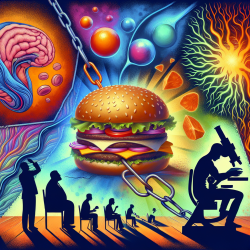The intersection of food addiction and psychosocial adversity is a burgeoning area of research that holds significant implications for practitioners working with individuals struggling with addiction-like eating behaviors. A recent review titled "Food Addiction and Psychosocial Adversity: Biological Embedding, Contextual Factors, and Public Health Implications" sheds light on the complex interplay between early life adversity (ELA), stress, trauma, and food addiction. This blog post delves into the key findings of this research and offers insights on how practitioners can implement these findings to improve their therapeutic approaches.
The Role of Early Life Adversity in Food Addiction
Early life adversity (ELA) is increasingly recognized as a critical factor in the development of food addiction. The research highlights that ELA can lead to long-lasting changes in the glucocorticoid and dopamine systems, increasing vulnerability to addiction-like behaviors. Practitioners should be aware of these biological underpinnings when assessing clients with potential food addiction issues.
- Biological Embedding: ELA can induce alterations in the hypothalamic-pituitary-adrenal axis and dopamine systems, which are crucial in regulating stress responses and reward processing.
- Epigenetic Changes: The study suggests that ELA may lead to epigenetic modifications that affect gene expression related to stress and reward pathways.
Psychosocial Contextual Factors
The review emphasizes the importance of considering psychosocial factors that contribute to food addiction. These include weight stigma, dietary restraint, and environmental influences. Understanding these factors can help practitioners tailor interventions that address not only biological but also psychological and social dimensions of food addiction.
- Weight Stigma: Experiencing stigma can exacerbate stress responses, leading to increased consumption of palatable foods as a coping mechanism.
- Dietary Restraint: Restrictive eating practices may paradoxically increase the risk of binge eating episodes, highlighting the need for balanced dietary interventions.
- Environmental Influences: Access to highly processed foods in certain neighborhoods can drive addiction-like eating behaviors.
Implications for Public Health and Policy
The findings from this research have significant public health implications. By understanding the biopsychosocial mechanisms underlying food addiction, practitioners can advocate for policies that reduce stigma and improve access to healthy foods. Additionally, integrating trauma-informed care into treatment models can enhance outcomes for individuals with a history of ELA.
- Reducing Stigma: Educating the public about the biological basis of food addiction can help decrease stigma associated with obesity and disordered eating.
- Policy Interventions: Advocating for policies that limit access to addictive foods in vulnerable communities can be a proactive approach to addressing obesity.
Encouraging Further Research
This review underscores the need for continued research into the complex relationship between ELA, stress, trauma, and food addiction. Practitioners are encouraged to stay informed about emerging findings in this field to refine their therapeutic strategies continually. Collaborative efforts across disciplines will be essential in developing comprehensive interventions that address both individual and societal factors contributing to food addiction.
To read the original research paper, please follow this link: Food Addiction and Psychosocial Adversity: Biological Embedding, Contextual Factors, and Public Health Implications.










